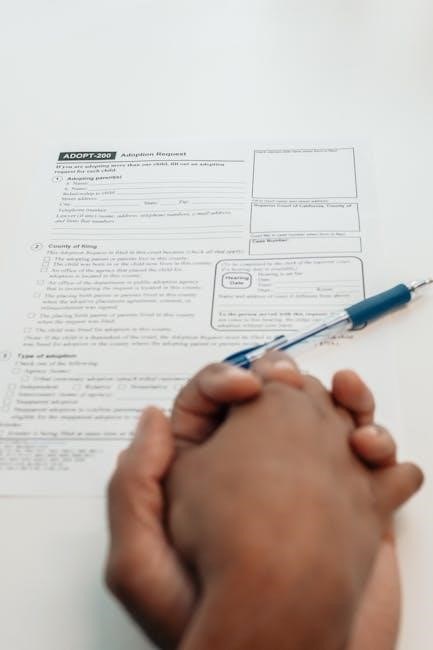A Pennsylvania Power of Attorney (POA) is a legal document enabling individuals to appoint an agent to manage their financial‚ medical‚ or property matters‚ ensuring their wishes are upheld even if they become incapacitated. It is available in various forms‚ such as durable‚ general‚ and limited‚ catering to specific needs and circumstances.
1.1 Definition and Purpose
A Pennsylvania Power of Attorney (POA) is a legal document where a principal appoints an agent to manage their financial‚ medical‚ or property affairs. Its purpose is to ensure the principal’s wishes are carried out‚ even if they become incapacitated‚ providing a flexible and reliable way to delegate decision-making authority.
1.2 Importance of Using a PA Power of Attorney Form
Using a PA Power of Attorney form ensures your financial‚ medical‚ and property decisions are managed by a trusted agent if you become incapacitated. It prevents court intervention and guarantees your wishes are respected. This document provides peace of mind‚ legal clarity‚ and protection of your rights and interests in Pennsylvania.
Types of Power of Attorney Forms in Pennsylvania
Pennsylvania offers various Power of Attorney forms‚ including durable‚ general‚ limited‚ medical‚ and special‚ each tailored to specific needs like financial‚ medical‚ or property management authority.
2.1 Durable Power of Attorney
A durable Power of Attorney remains in effect even if the principal becomes incapacitated‚ allowing the agent to manage financial‚ legal‚ and property matters. It is often used for long-term planning and requires notarization and two witnesses in Pennsylvania to ensure validity and protect the principal’s interests effectively.
2.2 General Power of Attorney
A general Power of Attorney grants broad authority to an agent to manage the principal’s financial affairs‚ such as handling bank accounts‚ real estate transactions‚ and business dealings. It is non-durable‚ meaning it terminates if the principal becomes incapacitated. Signing requires two witnesses and a notary public in Pennsylvania‚ ensuring its validity for short-term financial management.
2.3 Limited Power of Attorney
A limited Power of Attorney restricts the agent’s authority to specific tasks or periods‚ allowing the principal to maintain control over most affairs. It is ideal for temporary or targeted needs‚ such as managing property sales or handling taxes. Signing requirements include two witnesses and a notary public in Pennsylvania‚ ensuring its enforceability for designated purposes.
2.4 Medical Power of Attorney
A Medical Power of Attorney allows the principal to designate an agent to make healthcare decisions on their behalf if they become incapacitated. This document ensures the principal’s medical wishes are honored‚ including preferences for treatments‚ medications‚ or life-sustaining measures. It is often used alongside a living will to provide comprehensive healthcare directives.
2.5 Special Power of Attorney
A Special Power of Attorney grants an agent authority to act on specific‚ limited matters‚ such as managing real estate‚ handling tax issues‚ or overseeing business transactions. This form is ideal for principals who require representation in particular situations without transferring broad powers‚ ensuring tailored control over designated responsibilities.

Legal Requirements for Creating a Power of Attorney in PA
Creating a PA Power of Attorney requires the principal’s signature‚ notarization‚ and two witnesses. It must comply with 20 Pa.C.S. Chapter 56‚ ensuring validity and enforceability under Pennsylvania law.
3.1 Signing Requirements
A Pennsylvania Power of Attorney must be signed by the principal in the presence of a notary public and two witnesses. The principal must be mentally competent at the time of signing. This formal process ensures the document’s validity and prevents future legal challenges‚ adhering to state laws and protecting all parties involved.
3.2 Notarization and Witnesses
A Pennsylvania Power of Attorney must be notarized and signed by two witnesses. The notary public verifies the principal’s identity and mental capacity‚ while witnesses confirm the principal’s voluntary execution of the document. This ensures the POA’s legality and prevents disputes‚ with organizations ineligible to serve as witnesses under state law.
3.4 Governing Laws (20 Pa.C.S. Chapter 56)
Pennsylvania Power of Attorney forms are governed by Title 20‚ Chapter 56 of the Pennsylvania Consolidated Statutes. This chapter outlines the requirements‚ powers‚ and limitations for all types of POAs‚ ensuring legal validity and protecting the rights of principals. It also details the duties and responsibilities of agents under the law.

Downloading and Filling Out the PA Power of Attorney Form
PA Power of Attorney forms can be downloaded from official state websites or legal template platforms. Ensure the form aligns with Pennsylvania laws and is customized to meet specific needs before completion.
4.1 Where to Find the Form
PA Power of Attorney forms can be downloaded from legal template websites like LegalTemplates.net‚ official Pennsylvania state resources‚ or the Pennsylvania Department of Revenue. Ensure the form complies with state laws and is suitable for your specific needs.
4.2 Step-by-Step Guide to Completing the Form
Download the PA Power of Attorney form from a reliable source. Fill in the principal’s and agent’s details. Specify the powers granted‚ such as financial or medical authority. Include any special instructions. Sign the document in the presence of a notary and two witnesses. Ensure notarization and witness signatures are completed as required by Pennsylvania law.
Responsibilities and Powers of the Agent
An agent holds the authority to manage the principal’s financial affairs‚ make medical decisions‚ and oversee real estate transactions‚ acting solely in the principal’s best interest.
5.1 Financial Authority
The agent is authorized to manage the principal’s financial affairs‚ including bank accounts‚ investments‚ and real estate. They can pay bills‚ file taxes‚ and execute financial transactions. The agent must act in the principal’s best interest‚ maintaining transparency and accountability in all financial decisions and record-keeping.
5.2 Medical Decision-Making
The agent holds authority to make medical decisions on behalf of the principal‚ including consenting to treatments‚ surgeries‚ or end-of-life care. They can access medical records and ensure the principal’s healthcare wishes are followed. This power is activated if the principal becomes incapacitated‚ allowing the agent to act in their best medical interest.
5.3 Real Estate and Property Management
The agent may manage real estate transactions‚ including buying‚ selling‚ leasing‚ or mortgaging properties. They can also handle property maintenance‚ pay taxes‚ and insurance‚ ensuring the principal’s real estate interests are protected. Authority is specified in the POA‚ enabling the agent to act on the principal’s behalf in all property-related matters effectively.
Revoking a Power of Attorney in Pennsylvania
A Power of Attorney can be revoked by the principal through a written notice or by a court if the agent acts improperly. The revocation must be in writing and delivered to the agent and any relevant third parties to terminate the agent’s authority effectively.
6.1 Methods of Revocation
A Power of Attorney in Pennsylvania can be revoked through a written revocation notice delivered to the agent and relevant third parties. The principal must sign and date the document‚ which explicitly states the termination of the agent’s authority. Additionally‚ if the agent is found acting improperly‚ a court can revoke the POA.
6.2 Legal Implications of Revocation
Revoking a Power of Attorney in Pennsylvania immediately terminates the agent’s authority‚ requiring them to cease all actions on the principal’s behalf. A written revocation notice must be provided to the agent and relevant parties. Failure to comply may result in legal action against the agent for unauthorized decisions‚ protecting the principal’s rights.
Common Uses of a Power of Attorney in PA
A Power of Attorney in Pennsylvania is commonly used for managing financial affairs‚ making healthcare decisions‚ handling real estate transactions‚ and delegating authority for tax matters and vehicle registrations.
7.1 Financial Management
A Power of Attorney in Pennsylvania is frequently used to manage financial affairs‚ including handling bank accounts‚ paying bills‚ and overseeing investments. It allows the agent to act on the principal’s behalf‚ ensuring financial stability and continuity‚ even if the principal becomes incapacitated or unable to manage matters independently.
7.2 Healthcare Decisions
A Power of Attorney in Pennsylvania allows the agent to make healthcare decisions for the principal‚ such as consenting to medical treatments or accessing medical records. This authority is often included in a durable POA‚ ensuring the agent can act even if the principal becomes incapacitated. The document specifies the scope of medical decision-making power.
7.3 Real Estate Transactions
A Power of Attorney in Pennsylvania enables the agent to manage real estate transactions on behalf of the principal‚ including buying‚ selling‚ or leasing property. The document must specify the agent’s authority‚ such as handling property sales or managing rental properties. This ensures the principal’s interests are maintained in real estate matters.

Where to Find Free PA Power of Attorney PDF Templates
Individuals can find free PA Power of Attorney templates on reliable online sources and legal template websites. These platforms provide downloadable and customizable forms‚ ensuring compliance with Pennsylvania laws and requirements.
8.1 Reliable Online Sources
Reliable online sources like LegalTemplates.net‚ Pennsylvania state government websites‚ and legal document platforms offer free‚ downloadable PA Power of Attorney PDF templates. These sources ensure forms are compliant with state laws‚ easy to customize‚ and legally binding‚ providing a convenient way to create a valid POA without legal fees.
8.2 Legal Template Websites
Legal template websites like LegalTemplates.net offer state-specific‚ downloadable PA Power of Attorney forms in PDF format. These platforms provide customizable templates that comply with Pennsylvania laws‚ ensuring documents are legally binding. They often include guidance for completing forms‚ making it easier for individuals to create valid POAs without legal fees.
Durable vs. General Power of Attorney in PA
A durable POA remains effective if the principal becomes incapacitated‚ while a general POA terminates. Choose based on your long-term needs and desired duration of authority.
9.1 Key Differences
A durable POA remains in effect if the principal becomes incapacitated‚ while a general POA terminates. Durable POAs are ideal for long-term planning‚ covering financial and medical decisions. General POAs are suited for short-term or specific tasks‚ like managing affairs during travel. Choose based on your needs for continuity and authority duration.
9.2 When to Use Each Type
Use a durable POA for long-term planning‚ ensuring continuity in decision-making if you become incapacitated. Opt for a general POA for short-term or specific needs‚ like managing affairs during travel or handling a one-time transaction. Choose based on your needs for duration and scope of authority required.

Importance of Legal Advice
Consulting an attorney ensures your Power of Attorney complies with Pennsylvania laws‚ avoids legal pitfalls‚ and accurately reflects your intentions.
10.1 Consulting an Attorney
Consulting an attorney ensures your Power of Attorney is legally sound‚ tailored to your needs‚ and complies with Pennsylvania laws. An attorney can explain complex terms‚ prevent legal issues‚ and provide expert guidance on selecting the right type of POA for your specific circumstances.
10.2 Avoiding Legal Pitfalls
To avoid legal pitfalls‚ ensure your Power of Attorney is properly executed with notarization and witnesses‚ as required by Pennsylvania law. Clearly define the agent’s authority to prevent overreach‚ and regularly review the document to address any legal or personal changes.
